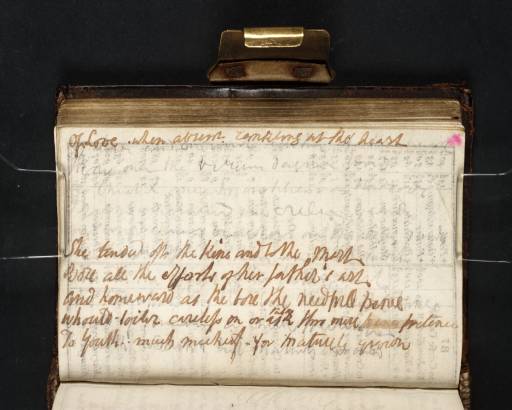Joseph Mallord William Turner Inscription by Turner: Draft of Poetry 1811
Joseph Mallord William Turner,
Inscription by Turner: Draft of Poetry
1811
Joseph Mallord William Turner 1775–1851
Folio 78 Verso:
Inscription by Turner: Draft of Poetry 1811
D08513
Turner Bequest CXXIII 75a
Turner Bequest CXXIII 75a
Inscribed by Turner in ink and pencil (see main catalogue entry) on white wove printing paper, 75 x 117 mm
Accepted by the nation as part of the Turner Bequest 1856
References
1862
Walter Thornbury, The Life of J.M.W. Turner, R.A. Founded on Letters and Papers Furnished by his Friends and Fellow-Academicians, London 1862, vol.II, p.24.
1897
Walter Thornbury, The Life of J.M.W. Turner, R.A. Founded on Letters and Papers Furnished by his Friends and Fellow-Academicians: A New Edition, Revised with 8 Coloured Illustrations after Turner’s Originals and 2 Woodcuts, London 1897, p.212.
1909
A.J. Finberg, A Complete Inventory of the Drawings of the Turner Bequest, London 1909, vol.I, p.347, CXXIII 75a, as ‘Verses’.
1966
Jack Lindsay, The Sunset Ship: The Poems of J.M.W. Turner, Lowestoft 1966, p.114.
1987
John Gage, J.M.W. Turner: ‘A Wonderful Range of Mind’, New Haven and London 1987, p.195–[6].
1990
Andrew Wilton and Rosalind Mallord Turner, Painting and Poetry: Turner’s ‘Verse Book’ and his Work of 1804–1812, exhibition catalogue, Tate Gallery, London 1990, p.172.
The whole page is taken up with the following verse:
Of love when absent rankling at the heart
[...]
She tended oft the kine and to the mart
Bore all the efforts of her father’s art
And homeward as she bore the needfull pence
Would loiter careless on or ask [?‘taken’ inserted above] thro mere <[?pence]> pretence
To youth much michief [sic] for maturely grown1
[...]
She tended oft the kine and to the mart
Bore all the efforts of her father’s art
And homeward as she bore the needfull pence
Would loiter careless on or ask [?‘taken’ inserted above] thro mere <[?pence]> pretence
To youth much michief [sic] for maturely grown1
The lines are written in ink over a draft in pencil, with four largely illegible lines (the second to the fifth, marked above by a single ellipsis) left in pencil only. Not given in Lindsay or Wilton and Turner, they are transcribed tentatively by Thornbury:
Moreover (?) the ...
No church and meads in (?) ... as the road (?)
Or anxious shivered in (?) ... bands (?)
And longed (?) ... on the oozy sands (?).
No church and meads in (?) ... as the road (?)
Or anxious shivered in (?) ... bands (?)
And longed (?) ... on the oozy sands (?).
Interspersed with drawings and the printed pages of Coltman’s British Itinerary, sixty-nine pages of this sketchbook are given over wholly or partly to these verses which Turner intended as a commentary for publication with the Picturesque Views on the Southern Coast of England which he sketched on the 1811 West Country tour (see the introduction to the sketchbook). The first lines are on folio 18 verso (D08396), and the last on folio 207 verso (D08736; CXXIII 204a).
The previous passage, on folio 73 verso (D08503; CXXIII 70a), concerns the trials and tribulations of love, which seems to have prompted Turner, whether from imagination or embroidering a local West Country anecdote or report, to compose this narrative of an innocent West Country cow-girl encountering soldiers guarding the coast during the Napoleonic Wars, which continues on folio 80 verso (D08516; CXXIII 77a) and concludes on folio 83 verso (D08520; CXXIII 80a). John Gage has characterised it as a ‘particularly poignant episode’, and a catastrophic development from Southern Coast images of women ‘busy while the menfolk, often, of course, on leave from active service, take their ease’,2 such as the watercolour Plymouth, with Mount Batten of about 1816 (Victoria and Albert Museum, London).3
Matthew Imms
June 2011
See transcriptions (followed here with slight variations) in Lindsay 1966, pp.114–15, the first line as the conclusion of ‘Love’ and the remainder as part of ‘The Lost Girl’, sections (k) and (l) of poem no.50, ‘On the Western Itinerary 1811’, Gage 1987 p.[196] and Wilton and Turner 1990, p.172; previously transcribed with variations in Thornbury 1862, II, p.24 and 1897, p.212.
How to cite
Matthew Imms, ‘Inscription by Turner: Draft of Poetry 1811 by Joseph Mallord William Turner’, catalogue entry, June 2011, in David Blayney Brown (ed.), J.M.W. Turner: Sketchbooks, Drawings and Watercolours, Tate Research Publication, December 2012, https://www

